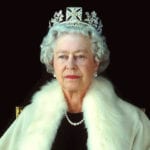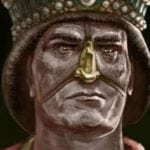 Mysteries
Mysteries  Mysteries
Mysteries  History
History 10 Surprising Stories About the Texas Rangers
 Humans
Humans 10 Philosophers Who Were Driven Mad by Their Own Theories
 Miscellaneous
Miscellaneous 10 Video-Game-Worthy Weapons and Armors from History
 Weird Stuff
Weird Stuff 10 Psychics Who Accurately Predicted Wartime Events
 The Arts
The Arts 10 Pieces of Art Inspired by a Broken Heart
 Health
Health 10 Science Fiction-Sounding New Medical Treatments
 History
History 10 Surprising Facts About the Father of Submarine Warfare
 Space
Space Ten Astonishing New Insights into Alien Worlds
 Weird Stuff
Weird Stuff 10 Bizarre Summer Solstice Rituals Still Practiced Today
 Mysteries
Mysteries Top 10 Haunting Facts About the Ghost Ship MV Alta
 History
History 10 Surprising Stories About the Texas Rangers
 Humans
Humans 10 Philosophers Who Were Driven Mad by Their Own Theories
Who's Behind Listverse?

Jamie Frater
Head Editor
Jamie founded Listverse due to an insatiable desire to share fascinating, obscure, and bizarre facts. He has been a guest speaker on numerous national radio and television stations and is a five time published author.
More About Us Miscellaneous
Miscellaneous 10 Video-Game-Worthy Weapons and Armors from History
 Weird Stuff
Weird Stuff 10 Psychics Who Accurately Predicted Wartime Events
 The Arts
The Arts 10 Pieces of Art Inspired by a Broken Heart
 Health
Health 10 Science Fiction-Sounding New Medical Treatments
 History
History 10 Surprising Facts About the Father of Submarine Warfare
 Space
Space Ten Astonishing New Insights into Alien Worlds
 Weird Stuff
Weird Stuff 10 Bizarre Summer Solstice Rituals Still Practiced Today
10 Wild Adventures Of Former Royals
Dynasties come and go, especially in the past few centuries, when monarchy ceased to be cool and got replaced by some fad called “democracy.” There have always been many pathways for a recently deposed royal family to travel. These include annihilation, communist “re-education,” a career as a gardener, or vanishing into history. A few ex-royals, however, carve out truly remarkable lives or pop up in the most unexpected of circumstances.
Honorable mentions go to two people we’ve mentioned before—Napoleon IV, killed by Zulus, and Duke Charles Edward of Saxe-Coburg-Gotha, who went from Queen Victoria’s favorite grandson to a Nazi—as well as Tsar Simeon II of Bulgaria, who returned to his country after the fall of communism and was elected prime minister.
10Prince Henri d’Orleans
1867–1901

Henri was a great-grandson of the last king of France, Louis-Philippe (deposed in 1848) and was born in Ham, England. An 1886 French law precluded him (and all other ex-royals) from joining the French military via the prestigious St. Cyr academy, and Henri consequently went on an around-the-world trip.
In 1889, he joined explorer Gabriel Bonvalot on a 17-month trek across Asia. It took him from Siberia through Turkistan to Tibet (including 1,000 previously unknown miles). It took him from the Himalayas to Tonkin in Vietnam. The feat earned him a gold medal from the French geographic society (and, later, from the British Royal Geographic Society, which placed him in the distinguished company of Stanley and Livingstone) as well as a cross in the Legion of Honor.
After a few more years traveling through France’s other colonies, Henri returned to Asia for further bouts of exploring. His numerous expeditions saw him discover the source of the Irrawaddy River as well as hitherto unexplored routes along the Red River and through Yunnan in southern China. To cap this off, he wrote a book with significant cultural, linguistic, and ethnographic observations.
Finally, Henri fought a duel with the Italian prince Vittorio Emmanuel after he accused Italian soldiers of cowardice in the invasion of Abyssinia. (The Italians had been soundly defeated by the technologically inferior locals at the Battle of Adowa.) He died of illness at the age of 34.
9Charles Joseph Bonaparte
1851–1921

Charles was a grandson of Napoleon’s younger brother, Jerome, and his American wife, Elizabeth Patterson. This marriage was forcibly dissolved by Napoleon, with Elizabeth and her son returning to America and Jerome being made king of Westphalia.
A brilliant scholar, graduating Harvard and Cambridge as a lawyer, Charles was keenly devoted to reform and justice. Thus, at a meeting of the Baltimore Civil Service Reform Association, he met Theodore Roosevelt. Several years later, during Roosevelt’s presidency, Charles briefly served as Secretary of the Navy before being made attorney general in 1906.
In this role, he combated corruption, land and timber fraud, peonage, and violations of treasury laws. He also personally appeared before the Supreme Court on numerous occasions, especially regarding antitrust laws, which ultimately secured the dissolution of the American Tobacco Company. The most significant action undertaken during Charles’s tenure as attorney general, however, was the establishment of a dedicated Bureau of Investigation. Previously, the Department of Justice had relied on Secret Service operatives from the Treasury. His bureau, in time, evolved into the FBI.
8Charles Roehenstart
1784–1854

A bastard grandson of Bonnie Prince Charlie, and the last realistic Jacobite pretender, Charles Roehenstart had a difficult childhood. His parents were Charlotte, Duchess of Albany (Bonnie Prince Charlie’s bastard daughter) and Archbishop Ferdinand de Rohan. Being born of a Catholic bishop required further obfuscation of Charles’s parentage, leading to his clumsy portmanteau name (a combination of Rohan and Stuart). His mother left shortly after his birth to take care of her father and died before she returned. Then, the French Revolution whisked him away to be educated in Germany.
After completing his education, Roehenstart joined the Russian army, where he rose to the rank of lieutenant colonel and attached himself to Duke Alexander of Wurttemberg, the Russian generalissimo. He accompanied the Duke back to Russia and managed to impress the Tsarina, but he fell out of favor when he turned down the hand of an heiress.
Shortly thereafter, Charles fell into financial difficulties and was briefly imprisoned by the machinations of the British government. After his release, he spent several years in the Austrian army and largely fell away into obscurity.
In later life, he endured the twin humiliations of being turned away from the home of the Duke of Wurttemberg (the son of his old patron) and the appearance of two Stuart impostors before dying quietly in Dunkeld, Scotland.
7Princess Xenia Of IKEA
1986–

No, IKEA hasn’t declared itself a kingdom (yet). It does, however, possess an incredibly gimmicky advertising campaign. IKEA promises that its beds will allow you to “sleep like a princess,” and, to prove this, they recruited an actual princess.
Xenia is the great-great-granddaughter of Friedrich Augustus III, the last king of Saxony, but her claims have been angrily rejected by the Royal House of Wettin. They say Xenia’s more humble recent ancestry (her parents were a farmer and a four-times married hairdresser) and its morganatic marriages give her no right to the title.
Indeed, the publishing of the princess’s autobiography had the 85-year-old head of House Wettin denounce Xenia as “a nothing. She can’t have a biography. This thing is a dreadful faux pas, a misfortune for the 1,000-year-old House of Wettin!”
Nevertheless, Xenia seems intent on making use of her royal ancestry. In addition to the IKEA ad and biography, she has also appeared on reality shows such as BBC’s Undercover Princesses and the German The Castle (nothing to do with Kafka). She also has her own rock band.
6Pierre Bonaparte
1815–1881

Pierre, son of Napoleon’s brother Lucien, was perhaps the black sheep of the Bonaparte family. After joining insurrectionary bands in Romagna in 1830, he briefly stayed with his uncle Joseph in the United States before plunging into the Colombian civil war in 1832. Here, despite still being a teenager, he attained the rank of colonel before hostilities wound down.
Returning home to Italy, Pierre had a dispute with the Pope that saw him fight with papal police (even killing one officer) before incarceration in Fort St. Angelo. Upon his release, he fruitlessly offered his services to numerous foreign nations before settling down to a life of hunting. During a trip in Albania, he clashed with bandits.
The revolution of 1848 saw him rush to Paris and attain election to the National Assembly. In this body, he sat on the far left, voted with the socialists, and loudly asserted his republicanism. This, and his marriage to a commoner, opened a large rift with his cousin, who claimed the throne as Napoleon III in 1852.
Pierre retired to a life of hunting and debauchery for some 20 years before exploding back onto the national stage in 1870. In that year, Pierre took offense with the articles of Paschel Grousset, and the two men agreed to a duel. Grousset sent fellow journalist Victor Noir to set the terms of the duel, but as a result of an animated argument, Pierre shot and killed the journalist. This event, and Pierre’s subsequent acquittal, contributed to a rising tide of republicanism that ultimately toppled Napoleon III after his serious defeats in the Franco-Prussian War.
5Duke Philippe Of Orleans
1869–1926

Another great-grandson of King Louis-Philippe, and the Orleanist royal pretender from 1894–1926, Duke Philippe, like his cousin Prince Henri, was barred from attending the military academy at St. Cyr. Instead, Philippe went to Sandhurst and served in India with the Royal Fusileers and King’s Royal Rifle Corps.
While there, he campaigned in Afghanistan as an aide to British Commander-in-Chief Lord Roberts. He also joined his cousin (during Henri’s around-the-world tour) for some tiger-hunting and adventuring in Nepal. Hunting quickly became a fixture in Philippe’s life, with later expeditions to East Africa bagging lions, rhinoceroses, and elephants.
In 1890, he flouted the laws requiring his exile and traveled to Paris, where he tried to enlist as a private in the French army. He was instead deported. Later that year, he had an affair with Australian opera singer Nellie Melba. The media response forced her to divorce, and Philippe removed himself to Africa.
Also a keen yachtsman, the Duke engaged in four Arctic expeditions in the 1900s. Despite being mainly dedicated to hunting reindeer and polar bears, these voyages yielded significant scientific insights and the discovery of a new island.
4Prince Wilhelm Of Prussia
1906–1940

As the eldest son of the crown prince (also named Wilhelm), Wilhelm was second in line to the German throne when it was abolished at the end of the First World War. His immediate family, however, elected to remain in Germany, and Wilhelm attended the University of Bonn. Here, he fell in love with fellow student Dorothea von Salviati.
His grandfather, the ex-Kaiser, still skulking in the Netherlands in the hopes of restoration, vociferously opposed the match. In the Kaiser’s opinion, Salviati, a member of the minor nobility, was an inappropriate consort for a future emperor. He counseled, “We are thoroughbreds . . . when we conclude a marriage such as with Fraulein von Salviati, it produces mongrels, and that cannot be allowed to happen.”
Undaunted, Wilhelm renounced his right to the throne to wed Dorothea. Despite this technicality, he was popular with the army, who regarded him as an “upright, sincere, and courageous soldier” and a prime candidate to replace Hitler should the Nazis be overthrown. Wilhelm, however, remained aloof from these plots and willingly went into battle with the Wehrmacht come World War II.
He was mortally wounded during the Battle of France. His funeral drew a massive 50,000 mourners, showing that there was still widespread sympathy for the Hohenzollerns. An unnerved Hitler issued the prinzenerlass, which barred other royals from military service.
3Achille Murat
1801–1847

Achille was the eldest son of Napoleon’s sister Caroline and trusted marshal Joachim Murat, the queen and king of Naples. Joachim was deposed and executed when he belatedly tried to assist Napoleon during the Waterloo Campaign, at which time Achille was 14. Initially sheltered in Austria, he made his way to America, where he bought a large estate near Tallahassee, Florida. Here, he was an active member of the local community, reaching the rank of colonel in the local militia, serving as alderman in 1824 and then mayor of the city in 1825, and acting as postmaster from 1826–1838. In addition to this, he wed Catherine Willis Gray, a great-grandniece of George Washington.
Achille’s successes are even more impressive considering his eccentric character. This included a refusal to drink water as it was “intended only for the beasts of the field” (this may have contributed to his refusal to wash his boots). This also included an adventurous diet of such curiosities as alligator tail soup, roasted crows, boiled owls, stewed cows’ ears, and turkey buzzard stew. These culinary experiments also resulted in his slaves being fed cherry tree sawdust.
Following the revolution of 1830, Achille briefly returned to Europe in a failed attempt to regain his French property and was made a colonel in the Belgian Foreign Legion before returning home. He died shortly before the revolution of 1848, which brought the Bonapartes back into power.
2Prince Leka Of Albania
1939–2011

Bundled out of his country as a newborn baby in the wake of Italian invasion, Leka spent his childhood flitting between Egypt, France, and England before settling in Spain as he was an admirer of General Franco. Leka set himself up as an arms dealer, and this resulted in his expulsion from Spain in 1979 when an arms cache was discovered in his home.
He went to South Africa through Gabon, where he reportedly scared off local troops by wielding a bazooka. In South Africa, he wed an Australian woman and welcomed a son, Leka II, in 1982. The birth saw an incredibly odd diplomatic nicety—the child’s maternity ward was briefly made Albanian territory.
Following the fall of communism, Leka returned to his country on two occasions. The first ended ignominiously, when he was deported as a result of an invalid passport, on which he gave his occupation as “King of the Albanians.” The second was slightly more successful, as during the country’s volatile political situation in 1997 (triggered by the collapse of pyramid investment schemes), he managed to secure a referendum on the return of the monarchy. This was defeated. Undaunted, Leka accused the socialist party of tampering with the votes and held mass street rallies while brandishing grenades and a pistol.
This quickly earned the ire of the government, and Leka was forced to flee back to South Africa. Eventually pardoned, he spent the last decade of his life living peacefully in Albania and campaigning on behalf of Kosovan Albanians.
1David Ochterlony Dyce Sombre
1808–1851

David was the step-great-grandson and adopted heir of Begum Sumru, ruler of the Indian princely state of Sardhana. Nevertheless, on the Begum’s death in 1836, the British East India Company seized the principality. David, despite inheriting a significant monetary fortune, appealed the action and traveled to London.
While his legal actions were quickly bogged down, the Anglo-Indian prince did manage to wed a Mary Anne Jervis, a viscount’s daughter, and was the first person of Asian descent elected to parliament. His election was annulled on the grounds of “gross, systematic, and extensive bribery,” and David’s life quickly unraveled.
His mental state deteriorated such that he constantly accused his wife of adultery (including with her own father) and challenged numerous people, including the elderly Duke of Wellington, to duels. David also allegedly shaved off his own eyebrows, assaulted his landlady, urinated and defecated in public, and apparently was frightened by spirits who told him to ritualistically kill a cat.
Whatever the truth of these claims, David’s eccentricities, combined with his oriental customs, dark skin, and obesity, largely alienated him from British society. This allowed Mary Anne and her well-connected family to have David declared insane, gaining them control of his vast wealth. David, however, escaped custody and fled to France, from where he launched numerous hearings to regain control of his fortune and even wrote a book refuting his diagnosis.
Each hearing simply reaffirmed the verdict of lunacy, and David slipped further into alcoholism and opiate addiction. To compound the issue, he had contracted venereal disease from frequent relations with prostitutes and consequently took many mercury-based treatments. He also had an addiction to betel nuts, which are used medicinally in several Asian countries but have severe psychoactive properties when taken in the large quantities David indulged in. This drug cocktail led to cognitive difficulties, and he died, dejected and alone, at the age of 43.
His death was particularly ignominious. His numerous illnesses had left him with reduced sensation in his extremities, and one night, he fell asleep with his feet by a fire, where they blistered and eventually turned septic. As for his still-vast wealth, David’s will left it to found a school in Sardhana, but this was successfully challenged by his erstwhile wife. To add insult to injury (or, in this case, death), in 1873, the courts awarded significant damages for the East India Company’s illegal seizure of property.
Miserable, lethargic, and mercilessly pessimistic, Tyler writes to whittle away his time on this speck of cosmic dust called Earth. Should you feel the need to spew vitriol at him, you can do so via email or Facebook.







